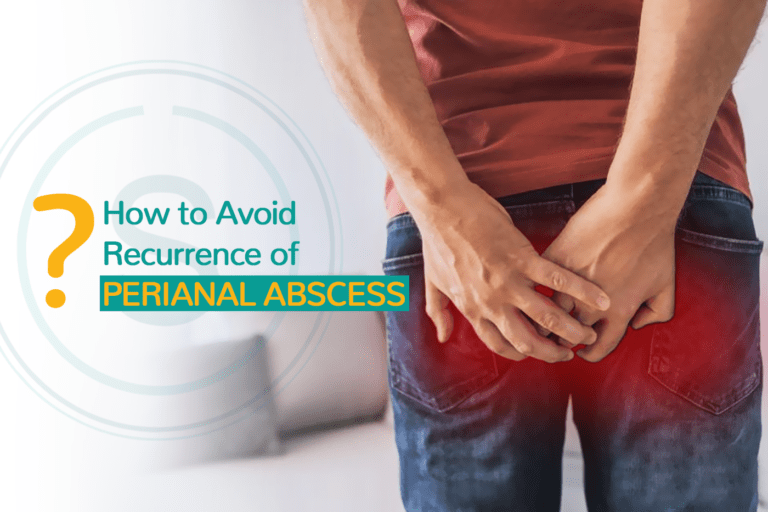Are you suffering from an anal abscess that is coming back again and again?
SMILES, the top fistula treatment hospital in Bangalore is here to help you.
A perianal abscess, a type of anorectal abscess is a collection of pus in the tissue around the anus & rectum. A blocked anal gland, sexually transmitted infections(STI), and infected anal fissures can cause an anal abscess.
Some other risk factors include inflammatory bowel diseases such as Crohn’s disease or ulcerative colitis as well as cancerous origins.
Unfortunately, despite proper treatment and complete healing anal abscess can come back. If an abscess comes back it needs immediate medical attention. Moreover, a recurrent perianal abscess can lead to anal fistula, sepsis or septicemia, and faecal incontinence.
Therefore, it is important to avoid recurrent anal abscess and get rid of life-threatening conditions. So, the experts of fistula treatment at SMILES outlined some simple ways to prevent persistent anal abscess.
7 Tips to Avoid Recurrence of Perianal Abscess
An anorectal abscess can reoccur due to the difficulty of passing stools.
The following tips and lifestyle habits can ensure quicker healing of perianal abscess and prevent fistula from coming back.
1. Avoid Constipation
Constipation and straining during bowel movements can aggravate abscess surrounded the perianal area. So, avoid eating fried foods, processed grains and dairy products that cause indigestion and constipation.
Instead, eat fiber-rich foods such as fruits, vegetables, and whole grains that improve gut function and prevent being constipated.
2. Stay Hydrated
Drinking plenty of water can help flush out the toxins from the body and also prevent fistula formation. So, aim for eight glasses daily that helps in hydration and softer bowel movements.
Avoid caffeine and artificial beverages that cause dehydration and leads to complications such as anal fistula.
3. Sitz Bath
A sitz bath is soaking the anal area in a tub of warm water for 15-20 minutes several times a day. This helps clean the anal area, improve blood flow, relieve discomfort and promote healing of anorectal abscess and fistula in ano.
4. Attend Your Urge
Don’t ignore the natural urge to defecate, when your body gives you a signal to the bowel movement. Waiting too long to pass stools can weaken your muscles that let you know to defecate.
The longer you hold it, the harder it can get which makes it difficult to pass and cause perianal abscess and anal fistula.
5. Use Stool Softeners or Laxatives
Laxatives are the medications that stimulate your bowel movements or loose up stools. They are used to treat passing hard and dry stools and prevent constipation caused by painful bowel movements.
Stool softeners can also encourage contractions in the colon to move the stools along smoothly.
6. Sleep well
Digestive health experts explain that sleep quality and digestive disorders such as bloating, constipation, and diarrhoea are connected.
This is especially among people with irritable bowel syndrome (IBS). Thus, Sleep disorders or poor sleep can affect your bowel health, and in turn gastrointestinal (GI) health.
Avoid Stress
Stress can cause indigestion and constipation that results in a persistent abscess in the perianal area and also anorectal fistula.
This is due to the effects of stress hormones have on the body that can cause digestive disorders. So, avoid stress by getting into yoga, meditation, and other relaxation technique
Is a perianal abscess serious?
Perianal or simply an anal abscess can cause complications, but they are treatable. However, if the abscess is left untreated an anal fistula may develop, connecting the rectum to the skin that requires more intensive surgery. Furthermore, any untreated abscess continues to expand that eventually becomes a chronic systemic infection.
Noticed frequent anal abscess? Do not ignore it. A delay in treatment may cause a worsening of the condition and unnecessary complications – says Dr Parameshwara C M, the best gastroenterologist in Bangalore.
Consult SMILES and prevent an abscess from getting worse.

